Bill Schenley
2005-11-07 08:09:58 UTC
Steve McQueen, 50, Is Dead Of A Heart Attack After Surgery For Cancer
Photo: Loading Image...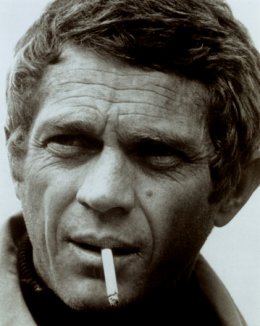
FROM: The New York Times (November 8th 1980) ~
By Peter B. Flint
Steve McQueen, whose portrayals of the tough, macho loner made him one
of the most celebrated and highest-paid film stars of the 1960's and
70's, died yesterday in a hospital in Juarez, Mexico.
The 50-year-old actor died of a heart attack after undergoing surgery
for removal of a cancerous tumor, a spokesman announced in Los
Angeles.
Mr. McQueen had been stricken by mesothelioma, a form of cancer that
attacks the lungs, chest and abdominal cavities, and doctors had
declared his condition hopeless.
In a desperate attempt to cure the disease, the actor entered a clinic
in Baja California three months ago and had been undergoing a
controversial regimen involving special diets, nutritional
supplements, injections of animal cells and, reportedly, laetrile.
Family Was at Bedside
Earlier this year he publicly denied having cancer ''to save my family
and friends from personal hurt and to retain my sense of dignity as,
for sure, I thought I was going to die.''
The actor's wife, Barbara, and his son Chad, 21, and daughter Terry
Leslie, 20, were with him at his death, according to Warren Cowan, the
family spokesman. He said that no funeral was planned.
Mr. McQueen's home in recent years had been his ranch in Santa Paula,
Calif. In his acting, Mr. McQueen had a deceptively casual and
freewheeling style. He personified a nonconformist and underdog,
battling to survive in a hostile society. In more than two dozen
movies, he was an antihero who unexpectedly performs heroics. His
characters combined, as Mr. McQueen did, an assertive individualism
and a naive vulnerability.
The screen image of the short, wiry actor was a swaggering veneer he
cultivated in his troubled youth and during a term in reform school.
His disheveled, sandy hair framed an oddly innocent, slightly pummeled
face with cool, blue eyes and an infectious grin that made the most
outrageous action seem forgivable.
The actor got his first major break in 1956, replacing Ben Gazzara in
the Broadway hit ''A Hatful of Rain.'' In 1958, he became a national
figure in the western television series ''Wanted - Dead or Alive.''
For three seasons he was Josh Randall, a bounty hunter, and made the
traditionally venal vocation not only credible but also sympathetic.
Established His Stardom
In movies, starting in 1958, he won increasing notice in several
otherwise routine adventures and firmly established his stardom in
''The Great Escape,'' a 1963 hit in which he played a casually
insolent prisoner in a German camp in World War II. The performance
won him the best-actor award at the Moscow Film Festival.
In the film's finale, Mr. McQueen acted as a decoy for the other
escapees, distracting the guards in a spectacular motorcycle chase.
Offscreen, he was a noted speed wheeler in both motorcycles and
high-powered cars. In the chase sequence of ''The Great Escape'' and
in other movies, he performed virtually all his derring-do himself,
despite increasing opposition by producers.
''Acting,'' he told an interviewer, ''is like racing. You need the
same absolute concentration. You have to reach inside of you and bring
forth a lot of broken glass. That's painful.''
His screen roles included a shiftless musician in ''Love With the
Proper Stranger'' (1963), a young gambler who challenges an aging
poker champion and loses his entire stake in ''The Cincinnati Kid''
(1965), an alienated sailor whose only real interest is ship engines
in ''The Sand Pebbles'' (1966) and a jaunty millionaire who robs a
bank to express his contempt for the System in ''The Thomas Crown
Affair'' (1968).
In 'Bullitt' and 'Papillon'
Other credits include ''Bullitt'' in 1968; ''The Reivers'' (1969),
based on the William Faulkner novel; ''Le Mans'' and ''On Any
Sunday,'' two 1971 racing adventures; ''Junior Bonner,'' in which he
was a fading rodeo contestant in 1972; ''Papillon'' (1973), about the
horrors of imprisonment and escape at Devil's Island; ''The Towering
Inferno'' (1974) in which he was a courageous fire chief. His last two
films were ''Tom Horn,'' about a redoubtable frontiersman overtaken by
civilization, and ''The Hunter,'' about a modern-day bounty-hunter.
Both opened this year.
The key to the actor's popularity, according to Robert Wise, who
directed ''The Sand Pebbles,'' was ''that lean and hungry look which
men identify with and which arouses in women their maternal instinct
and their desire to love.''
In 1976, Mr. McQueen immersed himself in a classic for the first time
and portrayed the idealistic protagonist in a film version of Henrik
Ibsen's tragic drama ''An Enemy of the People.'' This bold experiment
was opposed by producers and backers, who regarded the movie as
noncommercial and blocked financing for its release. The film has
never been shown to the general public.
Steve McQueen was born March 24, 1930, in Indianapolis. He was given
the name of Terrence Stephen, reputedly after a one-armed bookmaker
friend of his father. His father, a flier, left home when the infant
was 6 months old, and the son never saw him again.
Guarded About Childhood
In later years, Mr. McQueen was deliberately vague and guarded about
his unstable childhood. His early years were spent in Slater, Mo., on
a farm owned by a great-uncle. At the age of 9 he joined his mother
and a stepfather, living in Indianapolis and then in Los Angeles. He
did poorly in school and began what he called ''a little stealin'.''
His mother placed the 13-year-old in the Boys' Republic, a school for
problem youngsters, in Chino, Calif. He was there for 18 months,
ending his formal education in the ninth grade. Soon after his
release, he left home and worked as a deckhand on a Greek oil tanker,
a lumberjack in California, an oil rigger in Texas and a barker in a
traveling carnival.
Mr. McQueen served three years in the Marine Corps, where he learned
mechanics and also, he recalled, was demoted from private first class
to private ''about seven times.'' He spent 41 days in the brig for
going absent without leave.
After his discharge, in April 1950, he settled in Manhattan, living in
a $19-dollar-a-month cold-water flat in Greenwich Village. He earned a
precarious income tending bar, selling ballpoint pens and
encyclopedias and repairing television sets.
Friend Suggested Acting
Mr. McQueen decided to try acting at the suggestion of an actress
friend. He studied at the Neighborhood Playhouse and, in 1952, made
his stage debut, delivering one line, ''Nothing will help,'' in a
Yiddish-language production on Second Avenue.
Over the next four years he studied on scholarships at the Uta
Hagen-Herbert Berghof School and the Actors Studio and served his
apprenticeship in summer stock and minor television stints. With his
Broadway role in ''A Hatful of Rain,'' his career took off.
By the late 60's, Mr. McQueen was one of the biggest box-office
magnets in the world, earning more than $1 million a film and owning a
movie-production company and a plastics manufacturing concern. A
decade later, he received more than $3 million for a movie.
When he reached stardom, he bought a Spanish-style mansion overlooking
Santa Monica and the Pacific Ocean. He had a large gun collection, and
the hacienda was well guarded, like his manner with interviewers. He
tried to thwart their efforts to encapsulate him and make him appear
silly, as some did.
'Don't Cap Me Up'
''I don't like anybody trying to cap me up,'' he told a reporter. ''I
don't think anybody should try to cap someone else.'' The actor's
speech, a reporter wrote, was ''a nearly inaudible high-speed mumble
liberally salted with beatnik slang and barracksroom epithets.''
He shunned Hollywood's limelight and enjoyed tinkering with and
driving his motorcycles and half-dozen sports cars and placing high in
some major races. To keep trim, he exercised strenuously. He dressed
casually, invariably wearing jeans - with the labels cut off.
Mr. McQueen was married for 15 years to Neile Adams, a singer, dancer
and actress, who was the mother of his two children. The marriage
ended in divorce in 1971. He was married to Ali MacGraw, the actress,
from 1973 to 1978, when they were divorced. He married the former
Barbara Minty, a model, last January.
The actor was described variously as volatile, intense and streetwise
shrewd, distrustful of strangers and deeply loyal to friends. His
benefactions were personal, such as establishing a scholarship fund
for troubled youths at the Boys' Republic, which he occasionally
visited.
''The world is as good as you are,'' he remarked. ''You've got to
learn to like yourself first. I'm a little screwed-up, but I'm
beautiful.''
---
Photo: Loading Image...
---
Movie Hero Steve McQueen Dies Of Heart Attack At Age Of 50
FROM: The Washington Post (November 8th 1980) ~
By Gary Arnold, Staff Writer
Steve McQueen, who transcended a delinquent, restless youth to parlay
an appealing, low-key presence and extraordinary eye-contact into
international popularity as a star of Hollywood, action and adventure
movies, died yesterday in a hospital in Jarez, Mexico. He was 50.
His death was caused by a heart attack that occured several hours
after he had undergone surgery for the removal of a cancerous neck
tumor.
This summer, Mr. McQueen ended years of rumor and speculation about
his health by acknowledging that he had mesothelioma a form of lung
cancer usually considered incurable. The disease had spread to his
stomach, chest and neck.
"The reason I denied I had cancer," he revealed, "was to save my
family and friends from personal hurt and to retain my sense of
dignity . . . Hopefully, the cheap scandal sheets and curiousity
seekersill will not try to seek me out so I can continue my treatment.
I say to all my fans and friends, keep your fingers crossed and keep
the good thoughts coming." f
The wary, unassuming note of heroic fortitude evident in Mr. McQueen's
statement about his illness corresponds to the film image that made
him such a popular screen personality. This image began in a
significant way with his costarring in "The Magnificient Seven" in
1959, and continued for 15 years through hit vehicles such as "The
Great Escape," Love With the Proper Stranger," "The Cincinnati Kid,"
"Nevada Smith," "The Thomas Crown Affair," "Bullitt," "The Reivers,"
"Papillon," "The Getaway" and "The Towering Inferno."
Adroit as both a reticent yet supremely self-confident man of action
and a diffident yet devilishly attractive romantic lead, Mr. McQueen
perfected a disarmingly enjoyable, contemporary illusion of masculine
self-assurance. His most impressive embodiments of the man of action
were probably his roles as the cocky American prisoner-of-war in "The
Great Escape" and the cagy San Francisco police detective in
"Bullitt." His equally astute romantic flair found its classiest
expression in the role of a scheming, sexy criminal mastermind in "The
Thomas Crown Affair."
But whether he was playing a man of action or a man of affairs, Mr.
McQueen had an elusive ability to convey to his audiences the sense
that he was playing someone who mattered -- or at least someone who
was entirely credible in terms of the film. He was, in short, an
actor.
Mr. McQueen's concern about his health no doubt accounts for
mystifying aspects of his career over the past few years, notably an
unsuccessful attempt to convince the producers of "A Bridge Too Far"
and "Apocalypse Now" to pay him $3 million for three weeks of work on
each production.
As his illness worsened and he became resigned to the likelihood of
death, Mr. McQueen declined conventional medical advice and entered a
clinic, the Plaza Santa Maria Hospital near Tijuana, Mexico, for an
experimental, controversial course of treatment, administered by Dr.
Rodrigo Rodriguez, director of the hospital, and Dr. William D.
Kelley, a former Dallas dentist.
The therapy reportedly included intramuscular injections of animal
cells, massive doses of vitamins, an organic diet, coffee enemas and
laetrile. Mr. McQueen had remained in seclusion during his
confinement. However, Dr. Kelley and his associates reported on the
patient's progress at several news conferences and indicated that the
growth of the cancerous tumors had been arrested.
Mr. McQueen had been released from the Plaza Santa Maria Hospital for
a brief vacation at his ranch near Santa Paula, Calif. Last Sunday,
his doctors announced that he would probably undergo surgery this week
for what was characterized as a "dead" tumor on his neck. He underwent
the operation in Juarez.
According to publicist Warren Cowan, Mr. McQueen died at 2 a.m.
Friday, attended by his third wife, former model Barbara Minty, and
his daughter and his son by his first wife, the former dancer-actress
Neile Adams -- Terri, 21, and Chad, 19. Mr. McQueen and Miss Adams
were married in 1956, when both were promising newcomers on Broadway,
and divorced 15 years later. Mr. McQueen's 1973 marriage to actress
Ali MacGraw ended in divorce in 1978. He and Miss Minty were married
last January.
Mr. McQueen was born Terrence Stephen McQueen on March 24, 1930, in
Beech Grove, Ind., near Indianapolis. His father dropped out of sight
during Mr. McQueen's infancy. Some sources say that he abandoned the
family and others that he died. Mr. McQueen's mother left her child
with her parents, a farm couple living in Slater, Mo., and moved to
Los Angeles, where she eventually remarried.
At the age of 14, Mr. McQueen joined his mother and stepfather in Los
Angeles. It was a happy reunion. The boy was soon running with a
delinquent crowd and getting into minor scrapes with the law. As he
recalled during the shooting of "The Great Escape," "If they were
making a movie of my life, they could call it 'The Great Escape.' I
could just as easily have wound up a hood as an actor. I was pretty
hard to handle as a kid. My mother sent me to Boys Republic, a school
in Chino, Calif, for problem kids. It's probably the best thing that
ever happened to me: they straightened me out there."
Despite this testimonial, Mr. McQueen evidently sustained a prodigal
youth after dropping out of Boys Republic in the ninth grade. He
signed on as a deckhand on a Greek tanker sailing for South America,
jumped ship in the Dominican Republic and worked his way back to the
United States, where he embarked on a colorfully itinerant career as a
lumberjack, roughneck, carnival huckster, traveling salesman, delivery
boy, television repairman, bookie's runner and bartender, among other
trades.
Mr. McQueen enlisted in the Marine Corps in 1948 and eventually served
as a tank driver and mechanic. He also did six weeks in the brig on
one occasion for stretching a weekend pass into a two-week furlough.
Discharged (honorably) in 1950, he made his way to Greenwich Village
and luckily stumbled onto his true profession. An actress friend
introduced him to Sanford Meisner, director of the Neighborhood
Playhouse.
Meisner cast the startled novice in a bit role in a Yiddish play and
then took him as a drama student. Mr. McQueen continued his studies
with Uta Hagen and Herbert Berghof and then at the Actors' Studio. He
appeared in summer stock productions of "Peg O' My Heart" with
Margaret O'Brien and "The Member of the Wedding" with Ethel Waters. He
toured in the national company of "Time Out for Ginger" with Melvin
Douglas.
Mr. McQueen made his Broadway debut in 1956 with a role in "The Gep."
Later that year, he won his first leading role, replacing Ben Gazzara
in "A Hatful of Rain" and attracting favorable notice. During this
period, he also acted frequently in New York based television shows
and made his feature film debut as a bit player in "Somebody Up There
Likes Me," directed by Robert Wise.
A decade later, Mr. McQueen won his only Academy Award nomination for
his starring role in "The Sand Pebbles," also directed by Wise. Mr.
McQueen and the star of "Somebody Up There Likes Me," Paul Newman,
were destined to costar in "The Towering Inferno" many years later.
nThey also came to share a notable enthusiasm for auto racing.
Mr. McQueen and his new bride, Neile Adams, went to Hollywood with
high career hopes in 1957. A role as a laconic, steely-eyed bounty
hunter in the television Western series "Trackdown," which starred
Robert Culp, proved so striking that it secured Mr. McQueen a spin-off
series of his own. pFor three years he played bounty hunter Josh
Randall in a series called "Wanted -- Dead or Alive."
Mr. McQueen played leads in two minor features. "The Blob" and "The
Great St. Louis Bank Robbery," and supporting roles in two others,
"Never Love a Stranger" and "Never So Few," before landing his
made-to-order assignment as the droll, expert second-in-command of
"The Magnificent Seven," the rousing Western remake of Kurosawa's
"Seven Samurai" that also had a lot to do with the careers of Charles
Bronson, James Coburn and Robert Vaughn.
His decisive career break came in "The Great Escape." His climactic
stunt sequence on a motorcycle, particularly the moment when he
vaulted an eight-foot fence on his bike, turned him into an
international action favorite. Mr. McQueen performed the stunt
himself, and in its way it was as thrilling as the trickiest routine
ever finessed by Fred Astaire and Gene Kelly.
In 1969 and 1970, Mr. McQueen was rated the third most popular box
office star in the United States by Motion Picture Daily.
It is conceivable that his troubled youth helped imprint on his work
that watchful quality that was peculiarly fascinating on the screen.
There always seemed to be some interesting calculation going on behind
his eyes, which revealed a cunning affinity for the camera lens right
from the start. "Bullitt" became a sensation because of its thrilling
car chase sequences, but the disheveled threads of the plot were
neutralized by Mr. McQueen's eyes. It was a classic example of how a
star presence can hold a movie together.
Of course, there were two schools of thought about Mr. McQueen's
guarded style. Some critics complained that he never did anything.
Admirers responded that the apparent lack of effort was the whole
point: Mr. McQueen had achieved the kind of sheer physical eloquence
that suggests volumes about the drives and thought processess of a
character.
One of the admirers, film historian David Shipman, argued that "Steve
McQueen can act with the back of his head. He can act without doing
anything. . . . His voice isn't remarkable and he shows no sign of
versatility. But versatility, where he is concerned, is immaterial. He
has only to appear on the screen to fill it."
Mr. McQueen once evaluated himself with a typical, becoming modesty.
"I'm not a great actor," he said, "let's face it. I don't have a great
deal of scope. Someone like Richard Burton has great range as an
actor. There are certain things I can do, but when I'm bad, I stink. .
. . There's something about my shaggy-dog eyes that make people think
I'm good. I'm not all that good."
---
Photos:
Loading Image...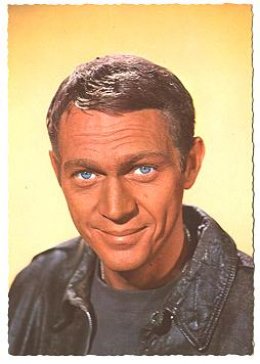
Loading Image...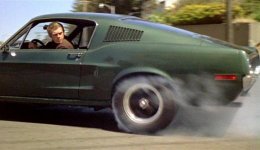
Loading Image...
Loading Image...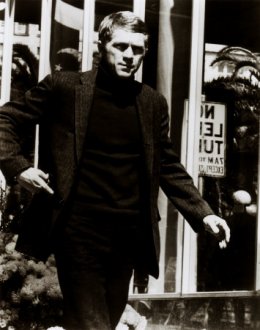
Loading Image...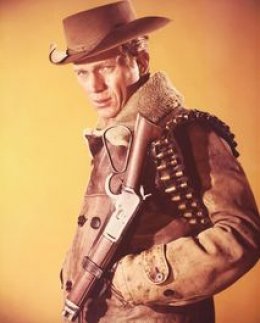
Steve McQueen in art:
Loading Image...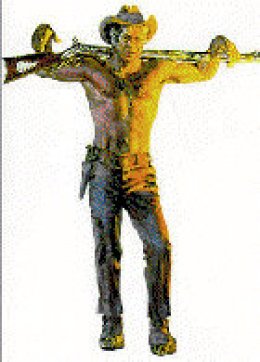
Loading Image...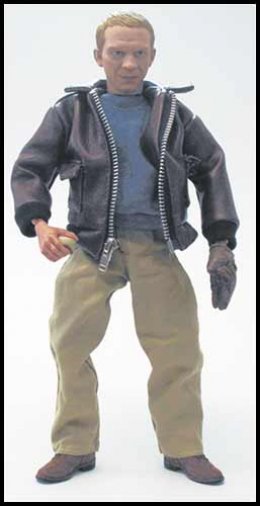
Loading Image...
Photo: Loading Image...
FROM: The New York Times (November 8th 1980) ~
By Peter B. Flint
Steve McQueen, whose portrayals of the tough, macho loner made him one
of the most celebrated and highest-paid film stars of the 1960's and
70's, died yesterday in a hospital in Juarez, Mexico.
The 50-year-old actor died of a heart attack after undergoing surgery
for removal of a cancerous tumor, a spokesman announced in Los
Angeles.
Mr. McQueen had been stricken by mesothelioma, a form of cancer that
attacks the lungs, chest and abdominal cavities, and doctors had
declared his condition hopeless.
In a desperate attempt to cure the disease, the actor entered a clinic
in Baja California three months ago and had been undergoing a
controversial regimen involving special diets, nutritional
supplements, injections of animal cells and, reportedly, laetrile.
Family Was at Bedside
Earlier this year he publicly denied having cancer ''to save my family
and friends from personal hurt and to retain my sense of dignity as,
for sure, I thought I was going to die.''
The actor's wife, Barbara, and his son Chad, 21, and daughter Terry
Leslie, 20, were with him at his death, according to Warren Cowan, the
family spokesman. He said that no funeral was planned.
Mr. McQueen's home in recent years had been his ranch in Santa Paula,
Calif. In his acting, Mr. McQueen had a deceptively casual and
freewheeling style. He personified a nonconformist and underdog,
battling to survive in a hostile society. In more than two dozen
movies, he was an antihero who unexpectedly performs heroics. His
characters combined, as Mr. McQueen did, an assertive individualism
and a naive vulnerability.
The screen image of the short, wiry actor was a swaggering veneer he
cultivated in his troubled youth and during a term in reform school.
His disheveled, sandy hair framed an oddly innocent, slightly pummeled
face with cool, blue eyes and an infectious grin that made the most
outrageous action seem forgivable.
The actor got his first major break in 1956, replacing Ben Gazzara in
the Broadway hit ''A Hatful of Rain.'' In 1958, he became a national
figure in the western television series ''Wanted - Dead or Alive.''
For three seasons he was Josh Randall, a bounty hunter, and made the
traditionally venal vocation not only credible but also sympathetic.
Established His Stardom
In movies, starting in 1958, he won increasing notice in several
otherwise routine adventures and firmly established his stardom in
''The Great Escape,'' a 1963 hit in which he played a casually
insolent prisoner in a German camp in World War II. The performance
won him the best-actor award at the Moscow Film Festival.
In the film's finale, Mr. McQueen acted as a decoy for the other
escapees, distracting the guards in a spectacular motorcycle chase.
Offscreen, he was a noted speed wheeler in both motorcycles and
high-powered cars. In the chase sequence of ''The Great Escape'' and
in other movies, he performed virtually all his derring-do himself,
despite increasing opposition by producers.
''Acting,'' he told an interviewer, ''is like racing. You need the
same absolute concentration. You have to reach inside of you and bring
forth a lot of broken glass. That's painful.''
His screen roles included a shiftless musician in ''Love With the
Proper Stranger'' (1963), a young gambler who challenges an aging
poker champion and loses his entire stake in ''The Cincinnati Kid''
(1965), an alienated sailor whose only real interest is ship engines
in ''The Sand Pebbles'' (1966) and a jaunty millionaire who robs a
bank to express his contempt for the System in ''The Thomas Crown
Affair'' (1968).
In 'Bullitt' and 'Papillon'
Other credits include ''Bullitt'' in 1968; ''The Reivers'' (1969),
based on the William Faulkner novel; ''Le Mans'' and ''On Any
Sunday,'' two 1971 racing adventures; ''Junior Bonner,'' in which he
was a fading rodeo contestant in 1972; ''Papillon'' (1973), about the
horrors of imprisonment and escape at Devil's Island; ''The Towering
Inferno'' (1974) in which he was a courageous fire chief. His last two
films were ''Tom Horn,'' about a redoubtable frontiersman overtaken by
civilization, and ''The Hunter,'' about a modern-day bounty-hunter.
Both opened this year.
The key to the actor's popularity, according to Robert Wise, who
directed ''The Sand Pebbles,'' was ''that lean and hungry look which
men identify with and which arouses in women their maternal instinct
and their desire to love.''
In 1976, Mr. McQueen immersed himself in a classic for the first time
and portrayed the idealistic protagonist in a film version of Henrik
Ibsen's tragic drama ''An Enemy of the People.'' This bold experiment
was opposed by producers and backers, who regarded the movie as
noncommercial and blocked financing for its release. The film has
never been shown to the general public.
Steve McQueen was born March 24, 1930, in Indianapolis. He was given
the name of Terrence Stephen, reputedly after a one-armed bookmaker
friend of his father. His father, a flier, left home when the infant
was 6 months old, and the son never saw him again.
Guarded About Childhood
In later years, Mr. McQueen was deliberately vague and guarded about
his unstable childhood. His early years were spent in Slater, Mo., on
a farm owned by a great-uncle. At the age of 9 he joined his mother
and a stepfather, living in Indianapolis and then in Los Angeles. He
did poorly in school and began what he called ''a little stealin'.''
His mother placed the 13-year-old in the Boys' Republic, a school for
problem youngsters, in Chino, Calif. He was there for 18 months,
ending his formal education in the ninth grade. Soon after his
release, he left home and worked as a deckhand on a Greek oil tanker,
a lumberjack in California, an oil rigger in Texas and a barker in a
traveling carnival.
Mr. McQueen served three years in the Marine Corps, where he learned
mechanics and also, he recalled, was demoted from private first class
to private ''about seven times.'' He spent 41 days in the brig for
going absent without leave.
After his discharge, in April 1950, he settled in Manhattan, living in
a $19-dollar-a-month cold-water flat in Greenwich Village. He earned a
precarious income tending bar, selling ballpoint pens and
encyclopedias and repairing television sets.
Friend Suggested Acting
Mr. McQueen decided to try acting at the suggestion of an actress
friend. He studied at the Neighborhood Playhouse and, in 1952, made
his stage debut, delivering one line, ''Nothing will help,'' in a
Yiddish-language production on Second Avenue.
Over the next four years he studied on scholarships at the Uta
Hagen-Herbert Berghof School and the Actors Studio and served his
apprenticeship in summer stock and minor television stints. With his
Broadway role in ''A Hatful of Rain,'' his career took off.
By the late 60's, Mr. McQueen was one of the biggest box-office
magnets in the world, earning more than $1 million a film and owning a
movie-production company and a plastics manufacturing concern. A
decade later, he received more than $3 million for a movie.
When he reached stardom, he bought a Spanish-style mansion overlooking
Santa Monica and the Pacific Ocean. He had a large gun collection, and
the hacienda was well guarded, like his manner with interviewers. He
tried to thwart their efforts to encapsulate him and make him appear
silly, as some did.
'Don't Cap Me Up'
''I don't like anybody trying to cap me up,'' he told a reporter. ''I
don't think anybody should try to cap someone else.'' The actor's
speech, a reporter wrote, was ''a nearly inaudible high-speed mumble
liberally salted with beatnik slang and barracksroom epithets.''
He shunned Hollywood's limelight and enjoyed tinkering with and
driving his motorcycles and half-dozen sports cars and placing high in
some major races. To keep trim, he exercised strenuously. He dressed
casually, invariably wearing jeans - with the labels cut off.
Mr. McQueen was married for 15 years to Neile Adams, a singer, dancer
and actress, who was the mother of his two children. The marriage
ended in divorce in 1971. He was married to Ali MacGraw, the actress,
from 1973 to 1978, when they were divorced. He married the former
Barbara Minty, a model, last January.
The actor was described variously as volatile, intense and streetwise
shrewd, distrustful of strangers and deeply loyal to friends. His
benefactions were personal, such as establishing a scholarship fund
for troubled youths at the Boys' Republic, which he occasionally
visited.
''The world is as good as you are,'' he remarked. ''You've got to
learn to like yourself first. I'm a little screwed-up, but I'm
beautiful.''
---
Photo: Loading Image...
---
Movie Hero Steve McQueen Dies Of Heart Attack At Age Of 50
FROM: The Washington Post (November 8th 1980) ~
By Gary Arnold, Staff Writer
Steve McQueen, who transcended a delinquent, restless youth to parlay
an appealing, low-key presence and extraordinary eye-contact into
international popularity as a star of Hollywood, action and adventure
movies, died yesterday in a hospital in Jarez, Mexico. He was 50.
His death was caused by a heart attack that occured several hours
after he had undergone surgery for the removal of a cancerous neck
tumor.
This summer, Mr. McQueen ended years of rumor and speculation about
his health by acknowledging that he had mesothelioma a form of lung
cancer usually considered incurable. The disease had spread to his
stomach, chest and neck.
"The reason I denied I had cancer," he revealed, "was to save my
family and friends from personal hurt and to retain my sense of
dignity . . . Hopefully, the cheap scandal sheets and curiousity
seekersill will not try to seek me out so I can continue my treatment.
I say to all my fans and friends, keep your fingers crossed and keep
the good thoughts coming." f
The wary, unassuming note of heroic fortitude evident in Mr. McQueen's
statement about his illness corresponds to the film image that made
him such a popular screen personality. This image began in a
significant way with his costarring in "The Magnificient Seven" in
1959, and continued for 15 years through hit vehicles such as "The
Great Escape," Love With the Proper Stranger," "The Cincinnati Kid,"
"Nevada Smith," "The Thomas Crown Affair," "Bullitt," "The Reivers,"
"Papillon," "The Getaway" and "The Towering Inferno."
Adroit as both a reticent yet supremely self-confident man of action
and a diffident yet devilishly attractive romantic lead, Mr. McQueen
perfected a disarmingly enjoyable, contemporary illusion of masculine
self-assurance. His most impressive embodiments of the man of action
were probably his roles as the cocky American prisoner-of-war in "The
Great Escape" and the cagy San Francisco police detective in
"Bullitt." His equally astute romantic flair found its classiest
expression in the role of a scheming, sexy criminal mastermind in "The
Thomas Crown Affair."
But whether he was playing a man of action or a man of affairs, Mr.
McQueen had an elusive ability to convey to his audiences the sense
that he was playing someone who mattered -- or at least someone who
was entirely credible in terms of the film. He was, in short, an
actor.
Mr. McQueen's concern about his health no doubt accounts for
mystifying aspects of his career over the past few years, notably an
unsuccessful attempt to convince the producers of "A Bridge Too Far"
and "Apocalypse Now" to pay him $3 million for three weeks of work on
each production.
As his illness worsened and he became resigned to the likelihood of
death, Mr. McQueen declined conventional medical advice and entered a
clinic, the Plaza Santa Maria Hospital near Tijuana, Mexico, for an
experimental, controversial course of treatment, administered by Dr.
Rodrigo Rodriguez, director of the hospital, and Dr. William D.
Kelley, a former Dallas dentist.
The therapy reportedly included intramuscular injections of animal
cells, massive doses of vitamins, an organic diet, coffee enemas and
laetrile. Mr. McQueen had remained in seclusion during his
confinement. However, Dr. Kelley and his associates reported on the
patient's progress at several news conferences and indicated that the
growth of the cancerous tumors had been arrested.
Mr. McQueen had been released from the Plaza Santa Maria Hospital for
a brief vacation at his ranch near Santa Paula, Calif. Last Sunday,
his doctors announced that he would probably undergo surgery this week
for what was characterized as a "dead" tumor on his neck. He underwent
the operation in Juarez.
According to publicist Warren Cowan, Mr. McQueen died at 2 a.m.
Friday, attended by his third wife, former model Barbara Minty, and
his daughter and his son by his first wife, the former dancer-actress
Neile Adams -- Terri, 21, and Chad, 19. Mr. McQueen and Miss Adams
were married in 1956, when both were promising newcomers on Broadway,
and divorced 15 years later. Mr. McQueen's 1973 marriage to actress
Ali MacGraw ended in divorce in 1978. He and Miss Minty were married
last January.
Mr. McQueen was born Terrence Stephen McQueen on March 24, 1930, in
Beech Grove, Ind., near Indianapolis. His father dropped out of sight
during Mr. McQueen's infancy. Some sources say that he abandoned the
family and others that he died. Mr. McQueen's mother left her child
with her parents, a farm couple living in Slater, Mo., and moved to
Los Angeles, where she eventually remarried.
At the age of 14, Mr. McQueen joined his mother and stepfather in Los
Angeles. It was a happy reunion. The boy was soon running with a
delinquent crowd and getting into minor scrapes with the law. As he
recalled during the shooting of "The Great Escape," "If they were
making a movie of my life, they could call it 'The Great Escape.' I
could just as easily have wound up a hood as an actor. I was pretty
hard to handle as a kid. My mother sent me to Boys Republic, a school
in Chino, Calif, for problem kids. It's probably the best thing that
ever happened to me: they straightened me out there."
Despite this testimonial, Mr. McQueen evidently sustained a prodigal
youth after dropping out of Boys Republic in the ninth grade. He
signed on as a deckhand on a Greek tanker sailing for South America,
jumped ship in the Dominican Republic and worked his way back to the
United States, where he embarked on a colorfully itinerant career as a
lumberjack, roughneck, carnival huckster, traveling salesman, delivery
boy, television repairman, bookie's runner and bartender, among other
trades.
Mr. McQueen enlisted in the Marine Corps in 1948 and eventually served
as a tank driver and mechanic. He also did six weeks in the brig on
one occasion for stretching a weekend pass into a two-week furlough.
Discharged (honorably) in 1950, he made his way to Greenwich Village
and luckily stumbled onto his true profession. An actress friend
introduced him to Sanford Meisner, director of the Neighborhood
Playhouse.
Meisner cast the startled novice in a bit role in a Yiddish play and
then took him as a drama student. Mr. McQueen continued his studies
with Uta Hagen and Herbert Berghof and then at the Actors' Studio. He
appeared in summer stock productions of "Peg O' My Heart" with
Margaret O'Brien and "The Member of the Wedding" with Ethel Waters. He
toured in the national company of "Time Out for Ginger" with Melvin
Douglas.
Mr. McQueen made his Broadway debut in 1956 with a role in "The Gep."
Later that year, he won his first leading role, replacing Ben Gazzara
in "A Hatful of Rain" and attracting favorable notice. During this
period, he also acted frequently in New York based television shows
and made his feature film debut as a bit player in "Somebody Up There
Likes Me," directed by Robert Wise.
A decade later, Mr. McQueen won his only Academy Award nomination for
his starring role in "The Sand Pebbles," also directed by Wise. Mr.
McQueen and the star of "Somebody Up There Likes Me," Paul Newman,
were destined to costar in "The Towering Inferno" many years later.
nThey also came to share a notable enthusiasm for auto racing.
Mr. McQueen and his new bride, Neile Adams, went to Hollywood with
high career hopes in 1957. A role as a laconic, steely-eyed bounty
hunter in the television Western series "Trackdown," which starred
Robert Culp, proved so striking that it secured Mr. McQueen a spin-off
series of his own. pFor three years he played bounty hunter Josh
Randall in a series called "Wanted -- Dead or Alive."
Mr. McQueen played leads in two minor features. "The Blob" and "The
Great St. Louis Bank Robbery," and supporting roles in two others,
"Never Love a Stranger" and "Never So Few," before landing his
made-to-order assignment as the droll, expert second-in-command of
"The Magnificent Seven," the rousing Western remake of Kurosawa's
"Seven Samurai" that also had a lot to do with the careers of Charles
Bronson, James Coburn and Robert Vaughn.
His decisive career break came in "The Great Escape." His climactic
stunt sequence on a motorcycle, particularly the moment when he
vaulted an eight-foot fence on his bike, turned him into an
international action favorite. Mr. McQueen performed the stunt
himself, and in its way it was as thrilling as the trickiest routine
ever finessed by Fred Astaire and Gene Kelly.
In 1969 and 1970, Mr. McQueen was rated the third most popular box
office star in the United States by Motion Picture Daily.
It is conceivable that his troubled youth helped imprint on his work
that watchful quality that was peculiarly fascinating on the screen.
There always seemed to be some interesting calculation going on behind
his eyes, which revealed a cunning affinity for the camera lens right
from the start. "Bullitt" became a sensation because of its thrilling
car chase sequences, but the disheveled threads of the plot were
neutralized by Mr. McQueen's eyes. It was a classic example of how a
star presence can hold a movie together.
Of course, there were two schools of thought about Mr. McQueen's
guarded style. Some critics complained that he never did anything.
Admirers responded that the apparent lack of effort was the whole
point: Mr. McQueen had achieved the kind of sheer physical eloquence
that suggests volumes about the drives and thought processess of a
character.
One of the admirers, film historian David Shipman, argued that "Steve
McQueen can act with the back of his head. He can act without doing
anything. . . . His voice isn't remarkable and he shows no sign of
versatility. But versatility, where he is concerned, is immaterial. He
has only to appear on the screen to fill it."
Mr. McQueen once evaluated himself with a typical, becoming modesty.
"I'm not a great actor," he said, "let's face it. I don't have a great
deal of scope. Someone like Richard Burton has great range as an
actor. There are certain things I can do, but when I'm bad, I stink. .
. . There's something about my shaggy-dog eyes that make people think
I'm good. I'm not all that good."
---
Photos:
Loading Image...
Loading Image...
Loading Image...
Loading Image...
Loading Image...
Steve McQueen in art:
Loading Image...
Loading Image...
Loading Image...